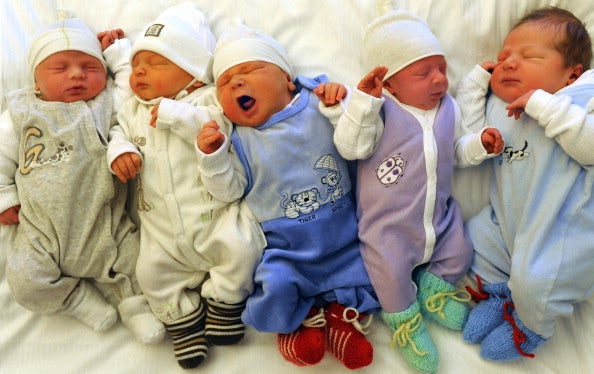I had my babies at 37 and 40 - and no, it's not because I'm a 'careerist'
The trend that we’re now seeing is one of choice and circumstance – at least mainly. The rest is dictated by the crippling cost of childcare and the damage having a child unfortunately still does to a woman’s career and earnings

Your support helps us to tell the story
From reproductive rights to climate change to Big Tech, The Independent is on the ground when the story is developing. Whether it's investigating the financials of Elon Musk's pro-Trump PAC or producing our latest documentary, 'The A Word', which shines a light on the American women fighting for reproductive rights, we know how important it is to parse out the facts from the messaging.
At such a critical moment in US history, we need reporters on the ground. Your donation allows us to keep sending journalists to speak to both sides of the story.
The Independent is trusted by Americans across the entire political spectrum. And unlike many other quality news outlets, we choose not to lock Americans out of our reporting and analysis with paywalls. We believe quality journalism should be available to everyone, paid for by those who can afford it.
Your support makes all the difference.Yet again this month the debate about older mothers - careerists, if you will - rose its ugly head following the latest statistics from the ONS on British births.
Yes it’s true, the average age of first-time mothers has been steadily increasing - but it has for first time fathers too. And yes it’s also true that in 2014, for the first time since records began in 1938, more babies were born to women over 35 than under 25 (21 per cent and 20 per cent respectively – so not exactly a huge difference). Not only are women having children later in life, then, but fewer women are having children at all. Is all of this a result of the rise of the female careerists?
Having had my first baby at the age of 37, and my second baby in 2014 at the age of 40, I feel that I have contributed to this statistical trend. But would I consider myself a ‘careerist’? No.
I don’t want to imply that centring your life round your career is negative. Absolutely not. I strongly believe in personal choice. And this latest trend in ‘older mothers’ is testament to the absolute importance of choice when planning a family – or choosing to stay child-free. In fact, increasing equality in the social, professional and financial environment has contributed to this social shift.
The UK is not the only country to witness a steady rise in the age at which women give birth. In Germany, for example, the average age of becoming a mum in 1970 was 24, but by 2009, this had risen to 30. On average, in wealthy OECD countries, women are delaying motherhood four years later than they were in 1970.
Women are well aware of the statistical risks of miscarriage and chromosomal disorders, but are not necessarily going to start having babies 10 years earlier. This is certainly true for me.
By the time that I graduated with my PhD in 2004, I had spent over 10 years in university, and at the age of 30 had only just started to establish my professional career. While I had been in a stable relationship with my now-husband for a long time, we didn’t get married or buy our first house until we were in our early thirties.
We both had planned to have a family some day; it was always on the cards. We just wanted to do it at ‘the right time’. For us, that time was being, as much as you can be, a bit more professionally and financially secure, and married. So as soon as we were ‘there’, we started trying to conceive.
Unfortunately, undiagnosed endometriosis meant a path of heartache, IVF and an ectopic pregnancy until we were lucky enough to have two beautiful children. If it wasn’t for my endometriosis, we would have probably conceived in our early thirties - when the majority of women have children.
The trend that we’re now seeing is one of choice and circumstance – at least mainly.
The rest is dictated by the crippling cost of childcare and the damage having a child unfortunately still does to a woman’s career and earnings.
So instead of labelling women over the age of 35 as ‘selfish careerists’ who stubbornly refuse to get pregnant during their early twenties, a more nuanced debate needs to happen. One that starts with politics and gender equality – rather than ends with personal insults and needless assumptions.
Join our commenting forum
Join thought-provoking conversations, follow other Independent readers and see their replies
Comments